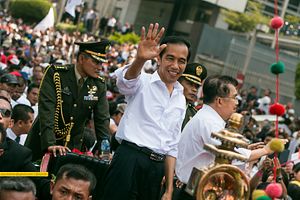Earlier this week, a key Turkish aerospace firm held a workshop in Indonesia that involved key local aerospace and defense firms. While the development was just the latest within the defense relationship between the two countries and few specifics were disclosed, it nonetheless shed light on the ongoing security collaboration between the two countries, including with respect to unmanned aerial vehicles.
As I have noted before in these pages, defense cooperation between Indonesia and Turkey has already been ongoing, whether it be on specific equipment, such as radar systems or tanks, or more general exchanges of expertise between their militaries.
But under Indonesian president Joko “Jokowi” Widodo, both sides have been looking at ways to expand that collaboration. Indeed, last year, during Jokowi’s state visit to Turkey, there was a memorandum of understanding inked between Indonesian state-owned aircraft manufacturer Dirgantara Indonesia and the Turkish Aerospace Industries (TAI) as well as a pledge to increase cooperation in areas like drone and submarine production, apart from other collaboration on terrorism and broader intelligence-sharing.
This week, some of that collaboration was in the headlines as TAI held a workshop in Jakarta on August 14 that involved local aerospace and defense companies. According a press release issued by TAI, the workshop focused on “possible cooperation on upcoming several bilateral opportunities such as the Unmanned Aerial Vehicle System Tender of the Indonesian Ministry of Defense.” The release directly mentions TAI offering its medium-altitude long endurance (MALE) Anka unmanned aerial vehicle (UAV).
Despite the release, exactly where Indonesia and Turkey are headed with respect to this area in the coming years still remains unclear. While there have been previous indications of both sides reaching official agreement, nothing has been publicly disclosed so far. And while the release alludes to TAI’s willingness to “fine tune” its offering to “satisfy the specific requirements of the Indonesian end user,” few specifics have been seen on that front — which would be critical to determining the prospects for future collaboration, including the specifics of the collaboration with Indonesian firms.
In the release, TAI was careful to note that the defense collaboration between the two sides would not be narrowly focused around UAV systems, but would be a more “sustainable, long-term, win-win relationship” for all parties to advance their goals “in local and global markets in the medium run.” How exactly that relationship evolves will depend on the technical details both countries are able to work out and then implement and follow through on in the coming years.
































